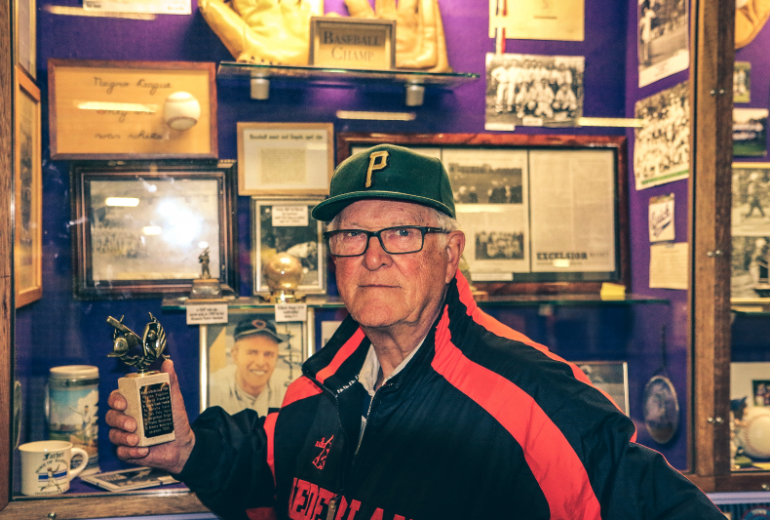Throughout the Covid-19 pandemic we have saluted our heroes. Naturally, we have heralded the amazing work of our heroes in health care who have stood on the front lines of this battle against an invisible enemy. Truth be told, we probably don’t even acknowledge their efforts sufficiently, but we often completely overlook the people in some of the other walks of life that have kept us going throughout this struggle. We all too frequently forget those who have kept us fed, kept our internet flowing, collected our refuse and maintained law and order. We also overlook a group that has been largely sidelined during this difficult period but is poised to lead us forward as we emerge from this battle and try to resume our lives with a sound mind in sound bodies. These are the heroes in sport and we should not only celebrate them, but consider the ways in which we might join them.
The losses of one sport in particular gave us pause to think about lives lived in the service of others. Baseball, or honkbal as is called, has been practiced for more than a hundred years in the Netherlands. The sport lost two of her own recently, within the span of a weekend: Han Urbanus (93) and Loek Lovendie (88). Johannes Urbanus, simply Han, was instrumental in transforming the game of baseball in this country from a summertime afterthought of football to a full-fledged sport with a worldwide reputation. As a young man, he became infatuated with the game. His expeditions to the Holy Land of baseball, the United States, provided him with the training and knowledge that he so willingly shared upon his return to his home country. With the zeal of a missionary, he helped spread the gospel of the New York Giants to the game’s converts and followers throughout the country. He would go on to play a leading role in establishing the tiny country as one of Europe’s very best in the sport, laying a foundation that stands to this day.
Lovendie, or Uncle Loek as he was more affectionally known, plowed an unbelievable amount of his time into starting and growing a baseball club in Amsterdam, the Pirates. From founding the club to being the heart and soul of its existence, Loek was the Pirates and the Pirates were him. The number of children who learned to play baseball from Loek is staggering. Many of them, now adults, lined the street running past the Pirates complex to say goodbye to their coach, as his funeral procession passed the site of his life’s work one final time.
Both men’s importance to the game in this country is impossible to overstate and yet they were not alone by any means. One need not look past the family tree of Han Urbanus to find other great contributors to sports. They are joined by the countless others who have coached, enabled, financed, officiated, organized, planned and cleaned up after the nations athletes. From archery to zumba, the sacrifice is real: rushing home from work to get to a training – grabbing a sandwich instead of a proper dinner, cycling through wind and rain, often in the dark of night, and skipping the weekend’s rest for a tournament that often will still be felt at work on Monday. But the reward is also real; and while some are honored with praise and ribbons in the twilight years of their service, it is sometimes only when they are laid to rest that we can fully see the fruits of their labour. Registers signed and funerals attended by people who had no other reason to join together for a common cause other than the sports they came to love. This societal cohesion that sport brings us is the indirect and powerful result of the work of heroes.
The sport of this nation is fueled by countless sandwiches made, cups of coffee served, lawns mowed and dressing rooms swept. It is also fueled by countless hours of coaching, fundraising, planning and organizing. A lion’s share of this work is done by ordinary people who do heroic deeds. Through their work, but often not even by design, our sports heroes have woven the fabric which blankets our society in a warmth that is difficult to quantify but so very tangible to those fortunate enough to have been draped in it.
What remains is what we all can do. Not everyone is cut out to be a hero. We don’t need to be. There is a role for everyone in sport. We can even look to see how we can involve our businesses, diplomatic missions and organizations in the important societal game-changer that is sport. We can even be heroic in just showing up to watch. One thing is certain, sport will play a monumental role in leading our society out of the darkness of the pandemic and back into the light. Sport calls on us like never before to step into the shoes of those that have gone before us leading the way. Legend has it that Loek Lovendie first played football in shoes that were too small for him, as there was no money for boots that fit. Love of sport will do that to person. Perhaps sport is an affliction, as some would suggest, but one thing is certain: it is highly contagious. Exactly the kind of contagion we can use right about now. Rest in peace Loek Lovendie and Han Urbanus. As Shoeless Joe said to Moonlight Graham in the film Field of Dreams, “You did good”. Now it’s time for the rest of us to play ball!
Written by John Mahnen
